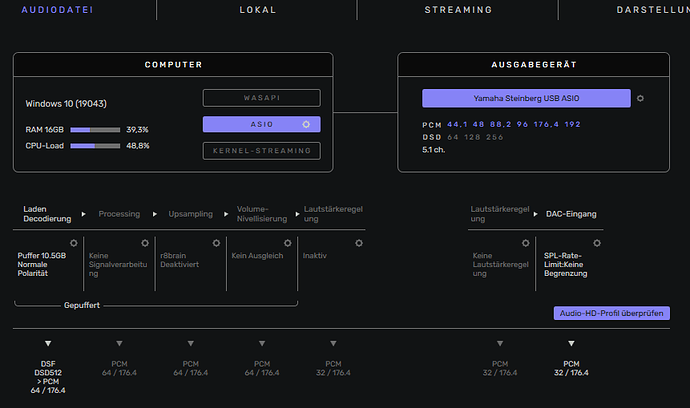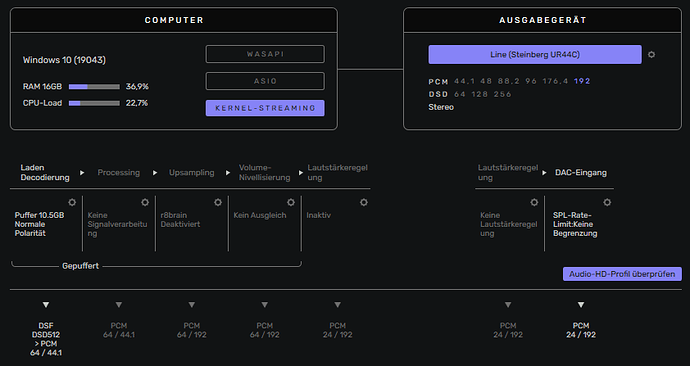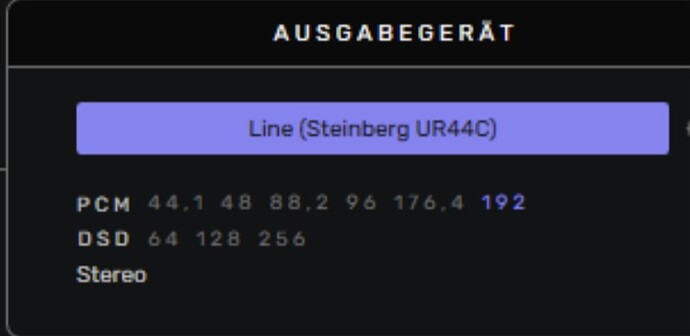Debug Info “ASIO” stage:
Audirvana Studio 1.11.0 (11100)
Windows 10 (19043) with 16GB physical RAM
Connected account of : Dirk Fokken
SIGNAL PROCESSING:
Polarity Inversion:
Globally: OFF
Per track: OFF
Effects plugins NOT ACTIVE
UPSAMPLING:
r8brain not in use
r8brain filter parameters
Bandwidth = 64.5357%
Stop band attenuation 135.357dB
Phase linear
AUDIO VOLUME:
Max allowed volume: 100
Replay Gain: None
SW volume control: OFF
LIBRARY SETTINGS:
Sync list: 1 folders
AUTO: D:\OneDrive\Musik\BibliothekHiRes
Library database path: C:\Users\gorch\AppData\Local\Audirvana\Audirvana\AudirvanaDatabase.sqlite
Remote Control server:
Listening on 192.168.178.36 on port 55464
ACTIVE STREAMING SERVICES
Qobuz: Connected as Qobuz Studio
=================== AUDIO DEVICE ========================
Max. memory for audio buffers: 10738MB
Local Audio Engine: ASIO ASIO 2 driver version 65536
Preferred device:
Yamaha Steinberg USB ASIO
Model UID:Yamaha Steinberg USB ASIO
UID:Yamaha Steinberg USB ASIO
Currently playing in Integer Mode:
Device: 6ch 32bits Integer, 24 bytes per frame 176.4kHz
Active Sample Rate: 176.4kHz
Bridge settings:
Sample rate limitation: none
Sample rate switching latency: none
Limit bitdepth to 24bit: OFF
Mute during sample rate change: ON
Selected device:
Local audio device
Yamaha Steinberg USB ASIO
Manufacturer:
Model Name: Yamaha Steinberg USB ASIO
Model UID: Yamaha Steinberg USB ASIO
UID: Yamaha Steinberg USB ASIO
6 available sample rates up to 192000Hz
44100
48000
88200
96000
176400
192000
Volume Control
Physical: No
Virtual: No
MQA capability
Auto-detect MQA devices: Yes
Not a MQA device, user set to not MQA
DSD capability: Unhandled
Device audio channels
Multichannel: 6 channels
Preferred stereo channels L:0 R:1
Channel bitmap: Ox3f, layout:
Channel 0 mapped to 0
Channel 1 mapped to 1
Channel 2 mapped to 2
Channel 3 mapped to 3
Channel 4 mapped to 4
Channel 5 mapped to 5
Audio channels in use
Number of channels: 6
Use as stereo device only: No
Simple stereo device: No
1 output streams:
Number of active channels: 6, in 1 stream(s)
Channel #0 :Stream 0 channel 0
Channel #1 :Stream 0 channel 1
Channel #2 :Stream 0 channel 2
Channel #3 :Stream 0 channel 3
Channel #4 :Stream 0 channel 4
Channel #5 :Stream 0 channel 5
6 ch Integer PCM 32bit little endian 44.1kHz
6 ch Integer PCM 32bit little endian 48kHz
6 ch Integer PCM 32bit little endian 88.2kHz
6 ch Integer PCM 32bit little endian 96kHz
6 ch Integer PCM 32bit little endian 176.4kHz
6 ch Integer PCM 32bit little endian 192kHz
Local devices found : 4
Device #0: ASIO4ALL v2 Manufacturer: Model UID: ASIO4ALL v2 UID: ASIO4ALL v2 Model Name: ASIO4ALL v2
Device #1: Generic Low Latency ASIO Driver Manufacturer: Model UID: Generic Low Latency ASIO Driver UID: Generic Low Latency ASIO Driver Model Name: Generic Low Latency ASIO Driver
Device #2: Realtek ASIO Manufacturer: Model UID: Realtek ASIO UID: Realtek ASIO Model Name: Realtek ASIO
Device #3: Yamaha Steinberg USB ASIO Manufacturer: Model UID: Yamaha Steinberg USB ASIO UID: Yamaha Steinberg USB ASIO Model Name: Yamaha Steinberg USB ASIO
UPnP devices found : 0
Debug info “Kernel Streaming” stage:
Audirvana Studio 1.11.0 (11100)
Windows 10 (19043) with 16GB physical RAM
Connected account of : Dirk Fokken
SIGNAL PROCESSING:
Polarity Inversion:
Globally: OFF
Per track: OFF
Effects plugins NOT ACTIVE
UPSAMPLING:
r8brain not in use
r8brain filter parameters
Bandwidth = 64.5357%
Stop band attenuation 135.357dB
Phase linear
AUDIO VOLUME:
Max allowed volume: 100
Replay Gain: None
SW volume control: OFF
LIBRARY SETTINGS:
Sync list: 1 folders
AUTO: D:\OneDrive\Musik\BibliothekHiRes
Library database path: C:\Users\gorch\AppData\Local\Audirvana\Audirvana\AudirvanaDatabase.sqlite
Remote Control server:
Listening on 192.168.178.36 on port 55464
ACTIVE STREAMING SERVICES
Qobuz: Connected as Qobuz Studio
=================== AUDIO DEVICE ========================
Max. memory for audio buffers: 10738MB
Local Audio Engine: Kernel Streaming
Preferred device:
Line (Steinberg UR44C)
Model UID:USB\VID_0499&PID_1730&REV_0101
UID:\?\SWD#MMDEVAPI#{0.0.0.00000000}.{7bb05b7a-e9c4-4c27-9cb6-96e6de3d6ddf}#{e6327cad-dcec-4949-ae8a-991e976a79d2}
Currently playing in Integer Mode:
Device: 2ch 24bits Integer, 6 bytes per frame 192kHz
Active Sample Rate: 192kHz
Bridge settings:
Sample rate limitation: none
Sample rate switching latency: none
Limit bitdepth to 24bit: OFF
Mute during sample rate change: ON
Selected device:
Local audio device
Line (Steinberg UR44C)
Manufacturer: Yamaha Corporation.
Model Name: Steinberg UR44C
Model UID: USB\VID_0499&PID_1730&REV_0101
UID: \?\SWD#MMDEVAPI#{0.0.0.00000000}.{7bb05b7a-e9c4-4c27-9cb6-96e6de3d6ddf}#{e6327cad-dcec-4949-ae8a-991e976a79d2}
Kernel Streaming capable
1 available sample rates up to 192000Hz
192000
Volume Control
Physical: No
Virtual: No
MQA capability
Auto-detect MQA devices: Yes
Not a MQA device, user set to not MQA
DSD capability: Unhandled
Device audio channels
Preferred stereo channels L:0 R:1
Channel bitmap: Ox3, layout:
Channel 0 mapped to 0
Channel 1 mapped to 1
Audio channels in use
Number of channels: 2
Use as stereo device only: No
Simple stereo device: No
1 output streams:
Number of active channels: 2, in 1 stream(s)
Channel #0 :Stream 0 channel 0
Channel #1 :Stream 0 channel 1
2 ch Integer PCM 24bit little endian 192kHz
Local devices found : 2
Device #0: Lautsprecher (Realtek High Definition Audio) Manufacturer: Realtek Model UID: HDAUDIO\FUNC_01&VEN_10EC&DEV_0892&SUBSYS_14621139&REV_1003 UID: \?\SWD#MMDEVAPI#{0.0.0.00000000}.{826f7587-53d6-4cde-a678-3ef81a039f91}#{e6327cad-dcec-4949-ae8a-991e976a79d2} Model Name: Unknown manufacturer
Device #1: Line (Steinberg UR44C) Manufacturer: Yamaha Corporation. Model UID: USB\VID_0499&PID_1730&REV_0101 UID: \?\SWD#MMDEVAPI#{0.0.0.00000000}.{7bb05b7a-e9c4-4c27-9cb6-96e6de3d6ddf}#{e6327cad-dcec-4949-ae8a-991e976a79d2} Model Name: Steinberg UR44C
UPnP devices found : 0



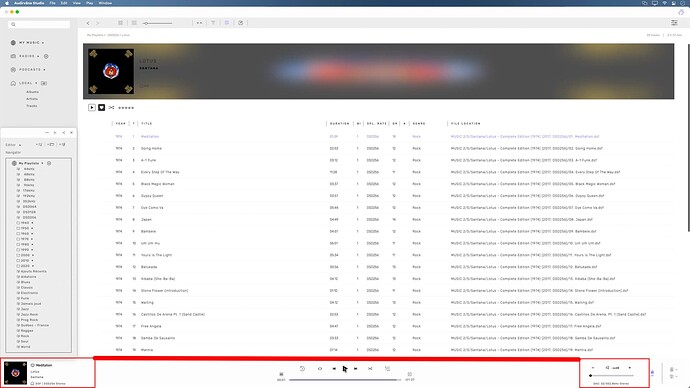
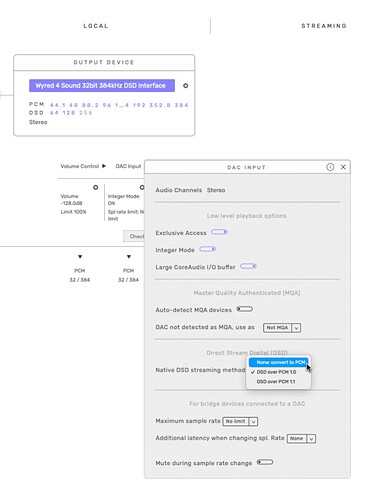
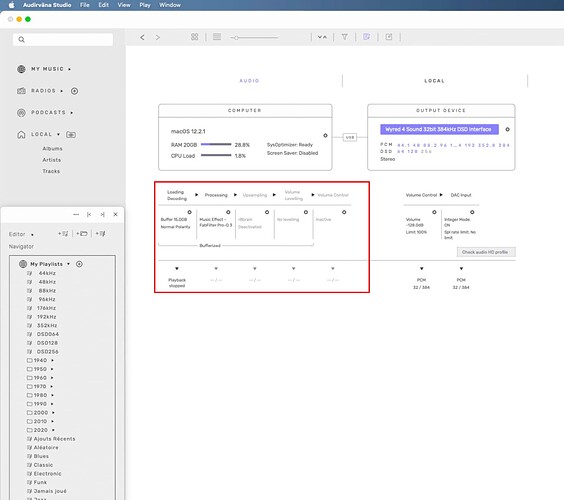
 all possible DSP.
all possible DSP. 